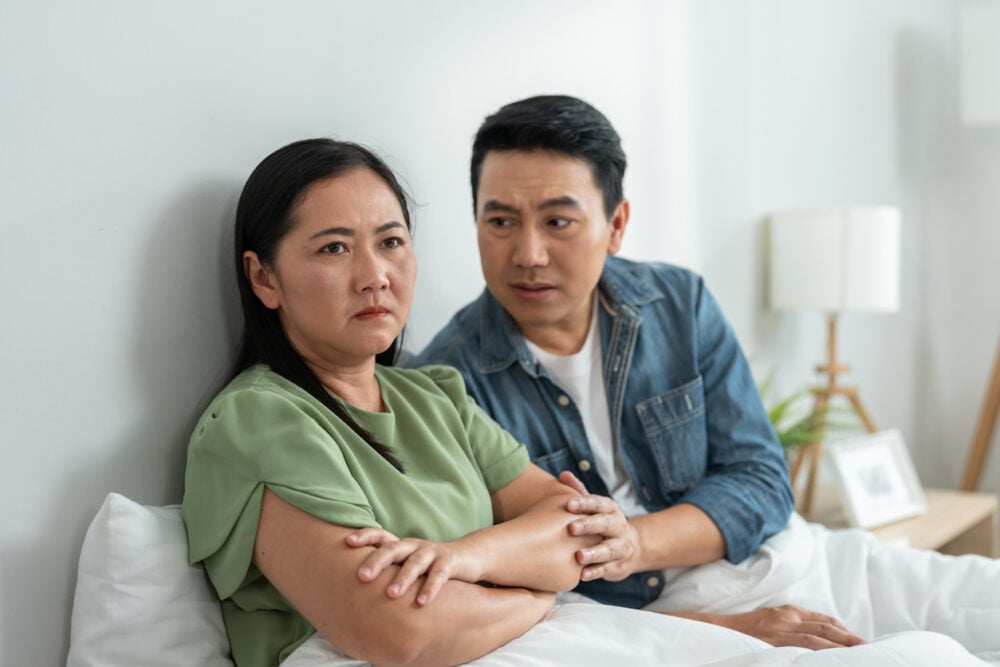These beliefs don’t protect your heart—they just keep you stuck.

Love is supposed to feel safe. Supportive. Like something you can grow inside. But when you’ve been fed the wrong beliefs about what love looks like—or what it’s supposed to cost—you start to confuse suffering with commitment. You stay when you’re unhappy. You rationalize behavior that hurts you. You tell yourself it’s normal, or that things will get better, or that it’s just what love is.
These lies aren’t just passed down by accident. They show up in movies, in families, in the quiet rules people follow without question. They turn pain into proof that you’re doing something right. They make you doubt your gut, ignore your needs, and accept way less than you deserve. And the worst part? They sound wise. Protective. Even romantic. But really, they’re just traps. If love is leaving you anxious, invisible, or constantly scared to walk away, it might not be love—it might be the lie you learned to call love.
1. Love is supposed to be hard.

Struggle gets romanticized constantly. Fights, miscommunication, one-sided effort—it all gets framed as passion or commitment. You’re told that if it’s real, it’ll be messy. That you have to suffer a little to prove it’s worth something. Jenna Ryu challenges this narrative in USA Today, writing that equating love with struggle can normalize toxic patterns rather than encourage growth.
Yes, relationships take effort. But effort isn’t the same as chaos. If every day feels like a test, if peace feels rare, if you’re constantly negotiating basic respect, that’s not just “normal relationship stuff.” That’s harm being framed as devotion. Real love has hard moments—but it doesn’t thrive on them. If the hard parts are constant and the safe parts feel rare, love isn’t what’s keeping you there. Fear is.
2. If they don’t hit you, it’s not abuse.

Many people were taught to measure harm only by bruises. If there’s no violence, it must not be that bad. According to advocates at WomensLaw.org, emotional abuse can be just as damaging as physical abuse, even though it often goes unseen or unacknowledged. It looks like gaslighting, controlling your choices, isolating you from friends, or making you feel small every time you try to speak up.
When you’re constantly questioning yourself, apologizing for how you feel, or walking on eggshells to avoid setting them off, that’s not just a communication issue. That’s manipulation. And the absence of hitting doesn’t mean the presence of love. Harm isn’t less harmful just because it doesn’t leave a mark. If your spirit feels bruised, if your mind feels twisted up trying to make sense of things—it’s valid. You don’t have to wait for it to get worse to believe it’s enough.
3. You’re lucky someone loves you at all.

This one runs deep. It shows up in people who were taught that love has to be earned. Andrea Szasz writes in The Guardian that survivors of childhood trauma often internalize the belief that they’re fundamentally unlovable—too needy, too emotional, too much. So when someone comes along who stays, they’re told to be grateful—no matter how they’re treated. Love, in this framework, is a scarce resource. You don’t get to be choosy. You just take what you can get.
But love isn’t a favor. And being in a relationship doesn’t mean someone is doing you a kindness. You deserve to be chosen and respected. Supported and seen. If someone makes you feel like they’re doing you a favor by staying, that’s not love—it’s leverage. You’re not lucky to be tolerated. You’re worthy of being loved well.
4. If you leave, you’re giving up too easily.

Leaving a relationship that isn’t working is often framed as quitting. As being selfish. As not trying hard enough. But the truth is, many people stay in painful relationships far longer than they should—because they’re afraid of being seen as someone who gave up. Especially if they were raised to believe love means staying no matter what. But ending something that’s hurting you isn’t weakness. It’s clarity. It takes strength to name what’s not working. To walk away when your needs are being ignored.
Staying in pain doesn’t make you loyal. It makes you lost. You’re allowed to leave even if you tried. Even if they’re a good person. Even if nothing “dramatic” happened. Wanting something more peaceful isn’t giving up—it’s growing up.
5. You’ll never find something better.

This lie keeps people stuck in cycles that drain them. It’s built on fear, not truth. The fear of being alone, of starting over, of not being chosen again. That fear gets reinforced by people around you, by the person you’re with, and by the parts of you that still believe you don’t deserve more.
But the idea that this is as good as it gets is a trap. Especially when “this” is making you miserable. Better doesn’t always mean a perfect partner waiting right away.
Sometimes better just means peace. Your own space. Your own voice. Time to heal and reconnect with yourself. You won’t know what’s possible if you never leave what’s hurting you. And you don’t have to wait for proof of better to know that this isn’t it.
6. Real love means staying no matter what.

This idea gets used to excuse everything—from emotional neglect to outright abuse. You’re told that true love means weathering every storm, holding on no matter how bad it gets. But there’s a difference between staying through a rough patch and staying in a relationship that’s slowly erasing you. Endurance doesn’t equal devotion. And pain isn’t proof of depth.
Love shouldn’t mean sacrificing your safety, your mental health, or your sense of self. If staying means constantly shrinking, silencing yourself, or abandoning your needs, that’s not love—that’s conditioning. Commitment without care isn’t love. It’s entrapment dressed up as loyalty. Walking away from something harmful doesn’t make you weak. It means you’ve stopped confusing survival with connection.
7. Love should be enough to fix everything.

You’re told that love is powerful, that it conquers all, that if you care enough, things will work out. But love without accountability doesn’t solve anything. It doesn’t change someone’s behavior.
It doesn’t undo harm. It doesn’t magically turn someone into a safe or supportive partner. And sometimes, love becomes the excuse for avoiding real change. Believing love should fix everything makes you stay longer than you should. It convinces you that leaving means you didn’t care enough. But love alone doesn’t build trust. It doesn’t heal wounds or change patterns. That takes action, consistency, and mutual effort. If you’re the only one working to make it better, love might be present—but it isn’t being practiced. And it’s not your job to make it enough.
8. You just need to communicate better.

This one shows up a lot in therapy speak. As if all problems are just a matter of saying the right thing, in the right tone, at the right time. And yes—communication matters. But it’s not a cure-all. You can’t reason someone into caring. You can’t use perfect phrasing to make someone respect your boundaries. And you can’t “communicate better” your way out of being ignored or manipulated.
This mindset puts the responsibility back on you, even when the problem isn’t yours to fix. It implies that if you were clearer, kinder, calmer, they’d finally get it. But sometimes, they do get it—and they just don’t care. Or they hear you, but they like the power they hold over you more than they like resolution. Communication can only work if both people are willing. And not everyone is.
9. Every relationship is a reflection of your own wounds.

This idea, often dressed in self-help language, makes everything your fault. If someone hurts you, you “attracted” it. If they’re cold, it’s your inner child. If you’re mistreated, it’s your lesson to learn. But while self-awareness is important, this kind of framing can become a trap—one that turns every red flag into a spiritual assignment.
You are not responsible for other people’s cruelty. You are not a magnet for pain just because you have healing to do. Yes, your patterns matter. But not every relationship is a mirror.
Some are just harmful. Some are mismatches. Some are the result of manipulation, not manifestation. Don’t let healing culture convince you to stay in something painful just because it “means something.” Sometimes it means you need to leave.
10. If you leave, you’re breaking the family.

This one hits especially hard for people with kids, shared lives, or tight-knit communities. You’re told that staying is noble. That breaking up will damage your children. That leaving will disappoint everyone. But staying in an unhealthy relationship doesn’t protect your family—it just teaches everyone to tolerate pain for the sake of appearances. Kids notice tension. They absorb silence. They learn from how love is modeled. If what they see is disrespect, disconnection, or fear, that becomes their blueprint. Leaving might be painful, but so is staying in something that’s breaking you.
You’re not ruining the family by leaving. You’re creating a chance for something more honest, stable, and whole. Sometimes the most loving thing you can do is walk away from what’s teaching everyone the wrong lessons.
11. You owe it to them to stay if they’ve been through a lot.

You hear their story. You see their pain. You understand their trauma. And slowly, their struggle becomes your reason to stay—even when you’re not okay. You tell yourself they need you. That you can’t abandon them.
That leaving would make you heartless. But empathy doesn’t require self-sacrifice. And compassion doesn’t mean living in pain so someone else doesn’t have to face their own. You can care about someone’s past and still protect your present. Their trauma might explain their behavior—but it doesn’t excuse it. And it doesn’t make you responsible for fixing them. You’re allowed to want peace, even if they’ve suffered. You’re allowed to leave, even if they’ve lost people before. Staying out of guilt isn’t love. It’s survival at your own expense.